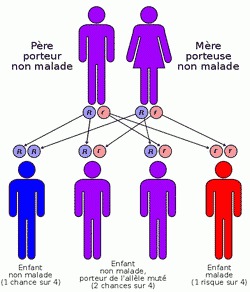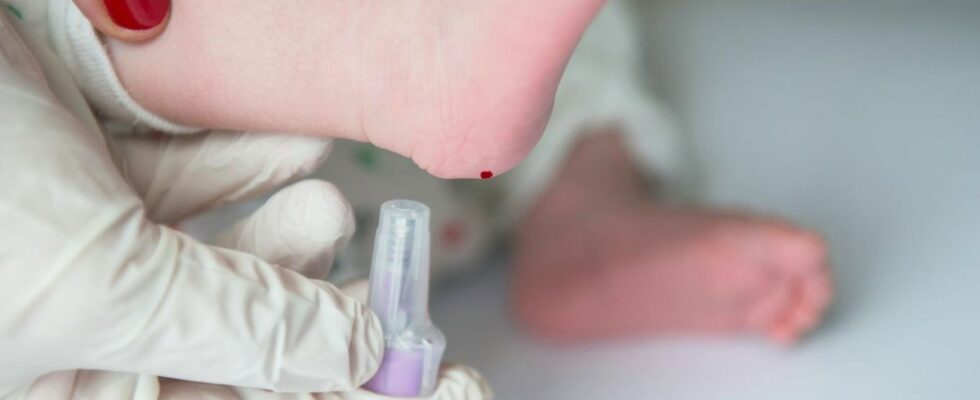Published on
updated on
Reading 3 min.
From November 1, screening for sickle cell disease (a hereditary genetic blood disease) will be generalized to all newborns, as part of the national neonatal screening program.
Screening for sickle cell disease at birth is becoming the norm. According to a press release from the Directorate General of Health (DGS), the approach will integrate the national neonatal screening program from November 1, 2024. It will therefore be carried out on all babies. Until now, screening was only generalized overseas and carried out in a targeted manner in mainland France, depending on the geographical origin of the parents. The objective is to detect certain rare but serious pathologies, generally of genetic origin, to treat them before the first signs.
The leading cause of stroke in children
Sickle cell disease is an abnormality of hemoglobin, which carries oxygen from the lungs to the tissues. It results in the deformation of red blood cells which lose their rounded shape and become more fragile. “Manifestations of the disease can appear from the age of 3 months and cause very serious repercussions. Sickle cell disease is, for example, the leading cause of stroke in children. recalls the General Directorate of Health.
Sickle cell anemia is a blood disorder that causes degeneration of red blood cells, a source of extremely painful crises and reduced life expectancy. Resulting from a mutation in genes to resist malaria, it appeared in areas such as Africa, the Antilles, the Mediterranean basin, South America, but is now widespread across the planet. There are more than 50 million people affected, yet, despite being the first genetic disease in the world, paradoxically, it is very little known.
Also known as sickle cell anemia, sickle cell anemia is a genetic disease linked to an abnormality of hemoglobin. The main symptoms are anemia (paleness, fatigue, etc.), severe painful attacks, especially bone pain which can be caused by fever, cold, dehydration or exertion, and increased sensitivity to certain infections.
Sickle cell anemia: the most widespread genetic disease in France
In the long term, this disease can be accompanied by vascular disorders, bone necrosis, kidney damage or even ulcers in the legs. The disability caused by this disease is progressive, so much so that the life expectancy of sick people is reduced by 20 to 30 years on average. It is transmitted by both parents, it is of course not contagious.

Sickle cell disease is a genetic disease hereditary (autosomal recessive inheritance). Clearly, sickle cell disease is transmitted by both parentsthis is of course not not contagious.
To be sick, you have to the child receives from each of these two parents a mutated allele of the gene governing the structure of hemoglobinthe protein that ensures the transport of oxygen in the blood. If he only receives one, he will not develop the diseasebut can pass it on if he has a child with a person in the same situation as him. Two “healthy carriers” then have a one in four chance of having a sick child together..
The reasons for systematic rather than targeted screening
According to the High Authority of Health, among the diseases detected at birth, sickle cell disease is the most common genetic disease in France. It is also the only disease detected at birth whose incidence is steadily increasing: 431 newborns were screened in 2016 compared to 684 in 2022.
According to the HAS, targeted screening showed signs of inadequacy. On the one hand, “there are risks that some newborns with sickle cell disease will not be screened, due to difficulties in applying targeting rules. Several studies, published since 2014, have shown a risk of error in targeting by healthcare teams.. On the other hand, “screening is deployed heterogeneously from one region to another: more than three out of four children benefit from it in Ile-de-France, compared to barely one in two nationally in 2020, while no region in France is free from cases”.
For all these reasons, the generalization of screening has been recommended since November 2022.
A few drops of blood taken from the baby’s heel or hand
“The regional neonatal screening centers will be responsible for deploying this generalization of screening throughout the territory, in conjunction with the national coordination center for newborn screening and regional health agencies”explains the DGS.
Concretely, this addition does not change much in the current screening for 13 diseases: neonatal screening is carried out in the maternity ward by taking drops of blood on a blotter, after a small prick on the newborn’s heel or hand. It is now systematically offered with parental consent, free of charge and collected between the second and third day of life. From November 1, these parents will also know whether or not their child is affected by this illness, which can be serious.
